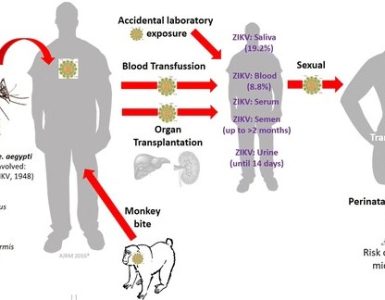 A test vaccine has been found to be protective against a synthetic version of the H5N1 virus, but the result might not predict performance on real pandemic H5N1
A test vaccine has been found to be protective against a synthetic version of the H5N1 virus, but the result might not predict performance on real pandemic H5N1
Scientists may be able to protect humans from avian influenza viruses – before they have even evolved to spread among people.
An experimental flu vaccine designed for a bird-specific H5N1 influenza virus can protect humans from a lab-made H5N1 strain engineered to pass among mammals. The finding is published today in the Journal of Clinical Investigation.
The vaccine was made the same way as seasonal flu shots. But it was tested on a synthetic H5N1 flu, tweaked to spread among ferrets, a model of human infection. Doing any research of this sort has been dogged by heated debate and self-imposed moratorium.
“The transmissible viruses are very scary because H5N1 has a very high mortality rate,” says lead author James Crowe, of Vanderbilt University in Nashville, Tennessee. But he says that the study justifies creating such dangerous pathogens in lab. “Our paper shows that there is a very clear mechanism for conventional vaccines to kill these things.”
Crowe and his colleagues took the blood of four patients given the experimental vaccine, and singled out the antibodies that could attack H5N1 viruses. They next wanted to test whether these antibodies could protect against the synthetic H5N1 virus — scientist’s best estimation of what a potentially pandemic virus may look like.
But scientists had enacted a voluntary moratorium on working with the highly pathogenic strains out of fear that they could get out of the lab or be used as a weapon.
To get around this, the researchers used DNA sequences from the synthetic virus to create pseudo-versions that would not cause disease. They found that antibodies from the patients’ blood could defeat the faux transmissible flu by binding between mutations that allow it to spread among mammals.
Richard Webby, a flu expert at St. Jude Children’s Research Hospital in Memphis, Tennessee, says that the finding confirms that vaccines based on the bird virus can still be useful against strains that become more infectious. “Those transmission changes didn’t really seem to affect the protection afforded by the vaccines,” he explains. Webby says that the approach could guide vaccine development for other looming avian flu viruses, such as H7N9.
But Simon Wain-Hobson, chair of the Foundation for Vaccine Research in Washington DC, is less convinced that the synthetic virus will exactly predict what a real pandemic H5N1 may do. Moreover, he says that the artificial virus did not lead to a better vaccine, which some scientists have claimed is the point of doing research with human-transmissible viruses.
Source: Scientific American

















